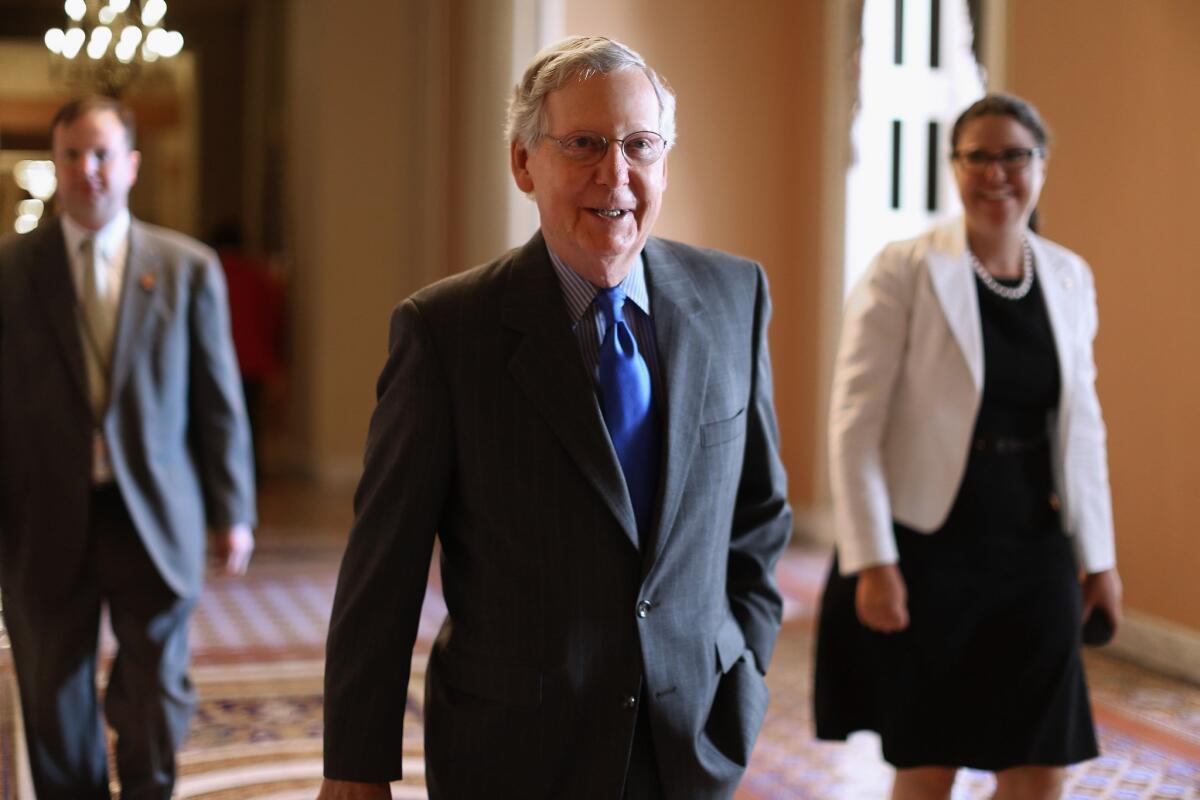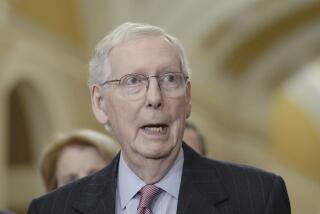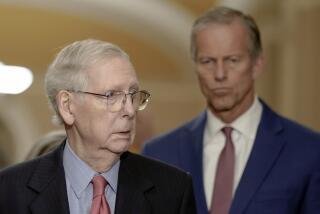Rand Paul and Mitch McConnell alliance of convenience is put to the test

Senate Majority Leader Mitch McConnell in the Capitol.
The relationship between Rand Paul and Mitch McConnell has always been more a marriage of political convenience than heartfelt bromance, and it is being tested now as never before.
The two Republican senators from Kentucky represent divergent flanks of the party, often pulling it in different directions — most recently over what to do about the nation’s domestic phone records surveillance program.
The blue-jeans-wearing Paul, 52, is a renegade upstart who deftly maneuvered the Senate to temporarily shut down the government’s bulk collection of Americans’ call records, a libertarian cause he has placed at the center of his struggling presidential bid.
Senate Majority Leader McConnell, 73, prefers starched collars and cuff links, and moves so deliberately that he has been compared to a turtle. The establishment elder fought hard to preserve the post-Sept. 11 surveillance program, arguing it doesn’t violate Americans’ privacy and is vital to catching terrorists.
This week, both men essentially lost as Congress gave final approval to a measure that bans the National Security Agency from collecting and storing bulk telephone records, but also gives intelligence agencies the power to access the same information by requesting it from telephone companies.
Paul and McConnell, for opposite reasons, voted against the compromise, which President Obama quickly signed into law.
For now, their political battle is over. But the flare-up between Paul and McConnell over the last week triggered such uncharacteristically public displays of hot temper and cold stares that it remains unclear whether their match made of expediency will survive.
Paul, who helped McConnell win a tough reelection fight last year, repeatedly and publicly defied the Senate leader regarding the spy program during the last few weeks. First, he seized control of the Senate floor for a 10 1/2-hour filibuster-like talk-fest last month, and then he blocked McConnell’s last-minute attempt to prevent the surveillance authority from expiring Sunday night.
McConnell, who has endorsed Paul in the crowded Republican presidential field, responded with bouts of exasperation and anger. He lashed out at the “demagoguery” and “campaign of disinformation” being spread about the spy program.
Even after Tuesday’s vote, there were signs that their unusual alliance had frayed. Paul could not help but gloat a little as his campaign received a flood of attention and donations. McConnell’s stature, meanwhile, took a hit.
Longtime political observer Al Cross in Kentucky evoked financial-meltdown language to describe this moment in the relationship of his home-state senators.
“I guess Tim Geithner would say it’s a stress test,” said Cross, director of the Institute for Rural Journalism and Community Issues at the University of Kentucky in Lexington, alluding to the former Treasury secretary’s measure of banks’ ability to survive a crisis.
“These guys are not cut from the same cloth, but they have a symbiotic relationship,” Cross said. “Any political relationship only goes so far, and we have seen the limits.”
But he predicted the relationship would survive.
“When you think of shotgun weddings, Paul shot himself into the family,” Cross said. “It complicates McConnell’s life. But he’s a pro; he can handle stuff like this.”
Advisors and those who know the senators downplayed the trouble in their union, saying both men have long recognized that ideological differences should not prevent them from being productive partners in the business of politics.
Five years ago, McConnell set a skeptical gaze on Paul, an ophthalmologist who ran as one of the first tea party candidates for Senate.
After Paul upended the leader’s handpicked candidate in the Republican primary for the open seat, McConnell swiftly tacked to support Paul’s campaign. Rather than fight the newcomer, he showered Paul with funding and establishment clout to beat the Democratic candidate.
Paul returned the favor last year, lending McConnell tea party credibility and grass-roots support to help survive a primary challenge and go on to win not only reelection to a sixth term, but the Senate majority leadership.
“They actually like each other personally, and they’ve both done so much for each other politically,” said Jesse Benton, a longtime senior advisor to Paul, who worked with McConnell’s campaign and now heads a “super PAC” backing Paul’s presidential bid.
“Even when [Paul’s] giving him a little bit of a pain in the rear, there’s a lot of understanding and forgiveness,” he said. “It’ll be over in a matter of days.”
McConnell is often so detached from the emotional realm of politics that not much can interfere with his ability to conduct business — even the bold affront these last few weeks from Paul, according to those familiar with his thinking.
Some political conspiracy theorists have speculated that McConnell allowed Paul to have this moment in the national spotlight to boost his presidential campaign, but others dismiss such a notion.
The two were chatting about local Kentucky politics Monday on the Senate floor. By the time voting was underway Tuesday, there appeared to be less interaction.
“People are watching pretty closely,” said John Hodgson, president of the Louisville Tea Party, who said Paul had the crowd chuckling Saturday night at the state Republican Party’s annual Lincoln Day Dinner in Lexington.
“He said that he and Mitch maintain a cordial relationship,” Hodgson said. “He said they haven’t had to go to counseling yet.”
If this really is the beginning of their uncoupling, it’s hard to envision who would walk out on whom.
Would the established leader shun the presidential contender at a time when Republicans are still sorting out which wing of their party will be dominant?
Or would the younger rebel part ways with the man who is arguably one of the most powerful elected officials in Congress?
Neither seems likely at the moment.
Asked this week about Paul’s actions, McConnell refused to take the bait.
“Look, I’m not going to start making — you’re trying to get me to make a derogatory comment about members of the Senate. I’m not going to do that,” he said. “I admire and respect them all.”
lisa.mascaro@latimes.com
Twitter: @LisaMascaro
More to Read
Get the L.A. Times Politics newsletter
Deeply reported insights into legislation, politics and policy from Sacramento, Washington and beyond. In your inbox three times per week.
You may occasionally receive promotional content from the Los Angeles Times.






